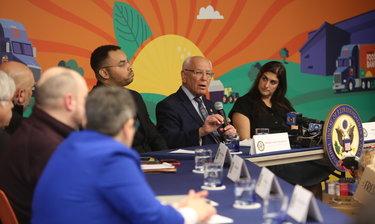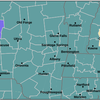‘It’s not waste, it’s investment’ say food pantry partners at Tonko roundtable
Congressman Paul Tonko was preaching to the choir when he met on April 4 at the Regional Food Bank headquarters in Latham with nine leaders of programs that help people suffering from hunger.
Tonko, a Democrat representing the 20th District, serves on the House Budget Committee.
“We’re asked to cut by the vote that was taken and approved — again, without my support — $880 billion minimally if not as much as $1.5 trillion,” said Tonko. “These are numbers that just boggle the mind and how we do that is going to be the exercise over the next several months.”
Tonko said that Republicans are seeking $220 billion in cuts to agricultural funding, much of which would come from food hunger programs, including SNAP (the Supplemental Nutrition Assistance Program, formerly known as food stamps) and emergency programs.
With a 23-percent reduction of the emergency program, Tonko said, there will be more reliance on states. That, in turn, he said, would lead to “a huge tax increase” on properties because it “then filters down to the local level.”
The tax cut, Tonko said, is “spending dollars on billionaires for a bonanza tax cut.”
He is gathering stories throughout his district — which includes all or parts of Albany, Rensselaer, Saratoga, Schenectady, and Montgomery counties — Tonko said “to amplify your voice, take that voice to Washington, and make certain that people are listening to these stories. They should compel us to do better.”
Asked what guarantees there are that Republicans would listen, Tonko responded, “No guarantees … I’ve got to believe that a lot of my colleagues understand what’s going on here, but don’t have the spine to challenge the people that are orchestrating this miserable effort.”
Tonko said that cuts by DOGE, the Department of Government Efficiency, to the United States Department of Agriculture “could affect 143,000 jobs in the state of New York with an impact of some $1.8 billion.”
He described the DOGE cuts as being done “in a wild west manner” and noted Donald Trump’s campaign pledge: “On Day One, our food costs are coming down”
“Now they’re going up,” said Tonko.
Tonko told the group, “These aren’t just numbers on a ledger. These are real losses that impact and hurt families, that hurt our children, that hurt the most vulnerable amongst us … President Trump and Elon Musk’s minions have slashed over a billion dollars worth of critical programs like food-purchasing programs and TEFAP,” he said, referencing The Emergency Food Assistance Program.
Trump and Musk, he said, have already proposed or enacted over $1 billion in cuts to anti-hunger initiatives like TEFAP and LFPA, the Local Food Purchase Assistance Cooperative Agreement.
Tonko also said, “Extreme policies take from those in need to line the pockets of the very few, the most rich amongst us. That to me is a cruel approach …. This kind of devastation to our hunger program — is that leadership? It’s cruelty, plain and simple.”
Tonko went on to say that hardworking farmers were bringing produce to the USAID program and having it rot as it is not distributed to people who need it with “children dying because of that consequence.”
Towards the end of the discussion, Tonko said, “It’s a critical juncture for this country to determine if we’re going to create a fair economy for all of us or continue this effort to allow a greater chasm to develop between those who are comfortable and those who struggle.”
“Pantry partners”
Those at the roundtable used words like “terrified” or “scared” to express their feelings about the cuts that lay ahead.
“We’re so low on chicken and other meat products, we’re giving out peanut butter as our protein source,” said one.
Michael-Aaron Poindexter, the chief program officer at the Regional Food Bank of Northeastern New York, said the food bank is responsible for feeding 350,000 people every month.
“That includes your seniors who have to choose between food and medicine," he said. “That includes the child that needs to take a backpack home on the weekend because they battle food insecurity. It’s your neighbor down the street who smiles at you, but has no idea where their next meal is coming from.”
The Food Bank, which serves 23 counties, distributed 54 million pounds of food last year, said Poindexter.
“These cuts would significantly impact that to the tune of close to 200 truckloads, which equates to 8 million pounds of food,” he said.
Poindexter noted that the “pantry partners” at the roundtable all receive food from the Regional Food Bank.
“If we don’t receive the food,” he said, “they don’t receive the food and then the 350,000 people around the state will not receive the food that they need every single day.”
Sister Betsy Van Deusen, chief executive officer of Catholic Charities, which covers the Albany Diocese’s 14 counties, including a food pantry in the Hilltowns, said her 11 pantries and three soup kitchens were already seeing significant impact.
“We’ve now had federal workers coming in who are coming to food pantries for the first time because they’ve been laid off,” she said.
Van Deusen also said, of cuts to food stamps, “If they have less coming in the door, they’re going to need and demand and require more from us … We also do domestic violence programming,” Van Duesen said of Catholic Charities, “and there’s much conversation about violence.”
When opportunities for farmers are gone because of cuts to the United States Department of Agriculture, local food sources will disappear, she said.
“Once a dairy herd has been dispersed, there’s no ability for a family to get that herd back,” said Van Duesen. “And that’s the end of a family farm.”
With USDA programs that kept farmers afloat being cut, she asked, “Who’s going to feed us? …. What those farmers do for us every day is make it possible for our grocery stores to be open.”
Van Deusen also stressed how malnourishment in children affects them throughout their lives and said she couldn’t imagine what it would be like to be a mother who was unable to feed her child.
“Crime is going to increase,” Van Deusen said, “because desperate people do desperate things. And what we’re doing in this nation right now is we’re making people desperate. We’re making them afraid. We’re creating chaos.”
Amaury Tañón-Santos, who directs the Sycamore Collaborative, a network of faith communities in the greater Schenectady area, said the collaborative serves 8 percent of the population in Schenectady.
Tañón-Santos said that $470,000 or about a third of Sycamore’s procurement budget comes from TEFAP. He also said that Sycamore has a contract for just over $500,000 with the Nourish New York program, which pays farmers for produce to be used by hungry people.
Tañón-Santos said the loss is about more than money; it is also a loss of important relationships and locally sourced food.
Over the past three years, he said, Sycamore has purchased from a local CSA (Community Supported Agriculture), representing about a quarter of their accounts.
“What will be lost, Tañón-Santos said, is “the ability for us to partner with growers and producers, the ability for us to give feedback from the people that we’re serving, so the food that they’re receiving is food that they like and want. It’s affecting the economy because we’re not going to be able to inject direct local money into the local economy to sustain that work forward.”
Tañón-Santos also said, “During the pandemic, when SNAP benefits were increased for children in poverty, half of the children in poverty in the state of New York were lifted out of poverty. We found a solution.”
Robin Fontanelli is president of the Sidewalk Warriors in Troy, an all-volunteer group that she said does “pop-up food distribution.”
“We are a low barrier organization,” she said, adding of the federal cuts, “Sadly, this is going to be forcing us to ask more questions and put parameters on our food pantry. You know, last night, we served 300 people and I had to ask questions and that was really hard, understanding where they are coming from.”
Fontanelli went on, “We have so many individuals that truly aren’t seen … They are fed by us. They see we care. We give them that dignity.”
Krystle Nowhitney Hernandez, director of LifeWorks Community Action in Saratoga County, said, as did most of those at the roundtable, that need ballooned during the pandemic and has not subsided.
Before the pandemic, LifeWorks was providing fewer than 200 services per month, she said..
“Currently, we’re providing 800 to 900 services a month,” she said, serving people from the foothills of the Adirondacks to the heart of Saratoga Springs.
With more than 100 volunteers, Hernandez said, “We truly are a community of neighbors helping neighbors, but we need the partnership from government to make that happen.”
She also spoke of the hardworking families, seniors, and veterans that depend on LifeWorks “because they have to.”
“Hunger does not discriminate based on political party,” she said.
Hernandez concluded, “Hardworking families in our communities need help. This is not cutting waste. It’s cutting investment in the families who are doing the absolute best that they can to provide for their families and their children.
“And we’re efficient as well,” she said of the organizations distributing food. “I would challenge any business on comparing their efficiency with our organization because we do a lot with a little. It’s not waste. It’s an investment.”



